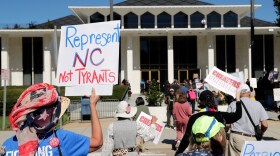More litigation on voting, redistricting and race reached North Carolina's Supreme Court on Monday, as justices began deciding if two constitutional amendments should be struck down because lawmakers who put them on the ballot were elected thanks to distorted district boundaries.
The state Supreme Court heard oral arguments in a lawsuit that alleges amendments to the North Carolina Constitution mandating photo voter identification and lowering the maximum possible income tax rate and approved by voters in November 2018 should be voided.
The state NAACP, the lawsuit plaintiff, says that the Republican-controlled legislature lacked authority to create the referendums because federal courts had declared nearly 30 districts used in 2016 elections were unlawful racial gerrymanders Legislators elected in 2016, however, were allowed to remain in their elected positions until the next General Assembly elections in 2018. Districts covering well over 100 of the 170 General Assembly seats were redrawn by then.
Still, the legislature agreed in 2018 to six constitutional referendums, four of which voters passed. The NAACP ultimately targeted the voter ID and income tax questions, saying that since the General Assembly at the time had been illegally constituted, the amendments were unlawfully on the ballot and should be canceled.
A trial judge agreed in early 2019 that the General Assembly had exceeded its authority to place the referendums on the ballot and struck down the amendments. A split state Court of Appeals panel overturned that ruling in 2020, however, saying such a standard would allow anyone to challenge any conventional legislation approved by a majority of lawmakers, causing chaos and confusion.
Constitutional amendments are different than regular legislation in North Carolina — they need support from three-fifths of the members of each legislative chamber to go on the ballot and aren't subject to gubernatorial veto. The NAACP says the gerrymandering helped Republicans gain those supermajorities.
Kym Hunter, an attorney representing the NAACP, said her client is seeking narrow relief — the declaration that legislators lost the ability to propose referendums to the constitution, which are effectively impossible to remove if approved.
“The will of the people was not being reflected in those (gerrymandered) districts,” Hunter told the justices. “It is within this court’s power, of course, to set clear, manageable standards and make very clear that it is distinguishing between regular legislation and constitutional amendments.”
Martin Warf, a lawyer representing top legislative leaders who were sued, said the 2017-18 General Assembly had not lost its sovereignty. Otherwise, Warf said, there would have been no method by which constitutional amendments could have been put on the ballot until lawmakers elected from replacement maps were seated in early 2019. There is no citizen initiative process in North Carolina to change the constitution.
“The relief plaintiff seeks striking two constitutional amendments is unprecedented and wrong,” Warf said, adding that “the General Assembly never lost its authority to act, and its acts are not subject to an institutional attack.”
Just 10 days ago, the Supreme Court ruled 4-3 that congressional and legislative districts approved by the Republican-controlled legislature for the next decade were illegal partisan gerrymanders and must be redrawn by this Friday. The ruling was split by political affiliation, with the registered Democrats on the court comprising the majority.
Six of the seven justices hearing the case asked questions during Monday's arguments. A ruling may not be known for months.
The procedures to approve the amendments, rather than their contents, are the focus of the arguments. But should the amendments be struck down, Republicans who have been in charge of the legislature since 2011 would suffer setbacks to emboss their policy prescriptions into the constitution.
The GOP has tried unsuccessfully to keep voter ID on the books, while the NAACP has fought to block it. A federal appeals court struck down a 2013 ID requirement, declaring it disproportionately harmed Black voters. Two other lawsuits challenging current voter ID rules are pending. The income tax amendment caps the rate at 7%, down from 10%. The current individual rate is 4.99%.
One of the justices — Republican Phil Berger Jr. — is the son of Senate leader Phil Berger, a named defendant in the case. The NAACP asked that the younger Berger be recused from the case, citing what it called an obvious conflict. But Berger Jr. declined to step aside, saying his father was named in his official capacity only, and the lawsuit was truly against the state.
Associate Justice Anita Earls, a registered Democrat elected to the court in 2018, was a lawyer in the earlier legislative redistricting case cited in the lawsuit. At the time, Earls and a colleague warned it was possible actions taken by lawmakers “without being elected from legal districts could be subject to challenge under state law.”






